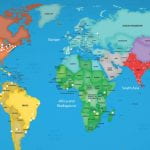by Jean Pierre Ndagijimana
On September 21st of each year, the United Nations observes the International Day of Peace. This day marks the UN’s declared 24 hours of cease-fire for everyone on Earth to experience the ideals of peace, to breathe freely, and to find a gap of calm. The international theme for the 2020 Peace Day was “Shaping Peace Together.” The pandemic has challenged our existing understanding of what peace really means. As the world celebrated “peace,” the pandemic reminded us that we must come together to protect and care for one another.
In this spirit, the Rwandan Community of Northern California (TRCC), the University Ministry at the University of San Francisco, together with the African Communities Program at Partnerships for Trauma Recovery (PTR) co-hosted a virtual event called “Celebrating Peace.” Given the complexities of the moment, we expanded the theme to reflect our collective need for de-stressing and shaping peace together.
The event opened with a welcoming message from Angélica Nohemi Quiñónez, the Interim Director of the University Ministry at the University of San Francisco (USF), who highlighted the importance of this space as one for sharing stories, different perspectives, opinions, and ideas. Tizita Tekletsadik, PTR’s African Communities Program Manager, followed, acknowledging the stress associated with the pandemic, and invited Yehoyada Mbangukira, the US Rwandan Community Abroad Secretary-General, who welcomed participants on the behalf of TRCC and moderated the conversations.
Our guest artists, Daniel Ngarukiye, Inzora Benoit, and Bosco Intore, played their part: they entertained the heart with soothing music performed on an Inānga, a traditional instrument from Rwanda and Burundi.
Diana Tovar, a graduate student in Migration Studies and a member of the USF Arrupe Human Rights Observatory, was one of our panelists. Ms. Tovar rooted her perspectives in her experience in Colombia. “Peace is a social construct, it requires recognizing that others’ pains are my pains too,” she said. For Ms. Tovar, in the current moment, “peace is an act of kindness: generosity, a smile, love, understanding, empathy, and putting aside what divides us.” She challenged the dominant notion of equating peace with the mere signing of peace agreements. For Ms. Tovar, peace is a path and a goal. According to the panelist, we achieve peace only when individuals and the larger society recognize that something is wrong, and they are willing to do their part to change what does not seem right. She condemned indifference to racial injustices and reminded the audience to use their privileges not just to help others but to build bridges between our communities.
Another panelist, Ms. Liliane Umuhoza, Founder of the Women Genocide Survivors Retreat Program, joined from Rwanda and drew from her personal experiences surviving the genocide against the Tutsi to define what peace requires. For Ms. Umuhoza, peace is fulfilling the promise of “Never Again” that failed to prevent the tragedies of 1994 after many other “Never Again” statements preceded the genocide against the Tutsi in Rwanda. By equating peace to equality, Ms. Umuhoza said that peace means access to food, shelter, and other basic needs. In addition to these material needs, she emphasized that when thinking about peace during the Coronavirus pandemic, mental health and wellbeing needs to be considered. In her words, “when your mind is not stable, it affects everything around you.” She called this type of peace “psychological safety,” where people can feel free to share their stories and feel heard.
Dr. Ernest Uwazie, another panelist, is the Director of the Center for the African Peace and Conflict Resolution at California State University, Sacramento. For Dr. Uwazie, “peace may look different from place to place and from time to time.” According to the professor, “peace is a satisfaction of one’s interests of justice, substantive justice.” Peace is recognizing that every human being is worthy of recognition, worthy of fair treatment, free from eminent and remote threats. In other words, it is when all of us can dream as far as we can. Dr. Uwazie reminded the audience that every human being has the potential to do good. He invited us to be resilient, conciliatory and he urged us to condemn not the person but the harmful act. Dr. Uwazie encouraged us to be humble in our own failings and to learn from our wrongs.
Event participants were also invited to contribute to our definition of peace. Here are some of their reflections:
- Peace today means living in a country that is protective of its own people; addressing the Coronavirus pandemic.
- “Entre los individuos, como entre las naciones, el respeto al derecho ajeno es la paz.” — Benito Juárez
- Inner peace, being in harmony with my own self and thoughts, as well as outer, wishing but also working towards peace – at local and global levels
- Kuri njye numva amahoro ari igihe umuntu aba adafite ibimuhungabanya muri we no hanze ye.
- Feeling safe at home and outside. When everyone has the same human rights and dignity respected.
When closing the conversations, Mr. Yehoyada, shared his major takeaway: Shaping peace together is within our power. This happens by being responsible, resilient, and not being indifferent when others are experiencing injustices. Peace comes from the understanding that we are all in this together because there is no community made up of one person.
The success of this event is a result of a collective commitment. I would like to thank all the contributors: the participants, panelists, the moderator, the guest artists, the organizing team, and the co-hosting organizations. The greater a community’s loss in common ground, the greater the resulting gain in violence. In our “humble togetherness,” we can all, indeed, shape peace together.




